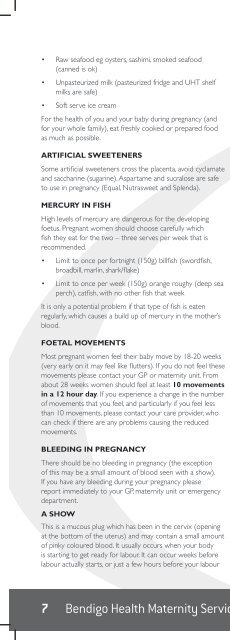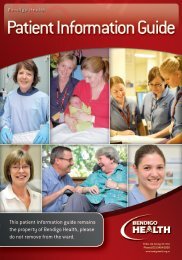Bendigo Health Maternity Services
Bendigo Health Maternity Services
Bendigo Health Maternity Services
Create successful ePaper yourself
Turn your PDF publications into a flip-book with our unique Google optimized e-Paper software.
• Raw seafood eg oysters, sashimi, smoked seafood<br />
(canned is ok)<br />
• Unpasteurized milk (pasteurized fridge and UHT shelf<br />
milks are safe)<br />
• Soft serve ice cream<br />
For the health of you and your baby during pregnancy (and<br />
for your whole family), eat freshly cooked or prepared food<br />
as much as possible.<br />
ARTIFICIAL SWEETENERS<br />
Some artificial sweeteners cross the placenta, avoid cyclamate<br />
and saccharine (sugarine). Aspartame and sucralose are safe<br />
to use in pregnancy (Equal, Nutrasweet and Splenda).<br />
MERCURY IN FISH<br />
High levels of mercury are dangerous for the developing<br />
foetus. Pregnant women should choose carefully which<br />
fish they eat for the two – three serves per week that is<br />
recommended.<br />
• Limit to once per fortnight (150g) billfish (swordfish,<br />
broadbill, marlin, shark/flake)<br />
• Limit to once per week (150g) orange roughy (deep sea<br />
perch), catfish, with no other fish that week<br />
It is only a potential problem if that type of fish is eaten<br />
regularly, which causes a build up of mercury in the mother’s<br />
blood.<br />
FOETAL MOVEMENTS<br />
Most pregnant women feel their baby move by 18-20 weeks<br />
(very early on it may feel like flutters). If you do not feel these<br />
movements please contact your GP or maternity unit. From<br />
about 28 weeks women should feel at least 10 movements<br />
in a 12 hour day. If you experience a change in the number<br />
of movements that you feel, and particularly if you feel less<br />
than 10 movements, please contact your care provider, who<br />
can check if there are any problems causing the reduced<br />
movements.<br />
BLEEDING IN PREGNANCY<br />
There should be no bleeding in pregnancy (the exception<br />
of this may be a small amount of blood seen with a show).<br />
If you have any bleeding during your pregnancy please<br />
report immediately to your GP, maternity unit or emergency<br />
department.<br />
A SHOW<br />
This is a mucous plug which has been in the cervix (opening<br />
at the bottom of the uterus) and may contain a small amount<br />
of pinky coloured blood. It usually occurs when your body<br />
is starting to get ready for labour. It can occur weeks before<br />
labour actually starts, or just a few hours before your labour<br />
7<br />
begins. Some women may not notice a show. If you have a<br />
show before 37 weeks contact your GP or the maternity unit.<br />
RH NEGATIVE BLOOD GROUP<br />
Ask your midwife or doctor to explain the recommended<br />
management that will be required. Occasionally this blood<br />
group can cause some problems. A brochure about Rh<br />
negative blood group is available for women who are Rh<br />
negative. Please ask a midwife for a copy.<br />
PRE-ECLAMPSIA<br />
This is a condition peculiar to pregnancy and the cause is<br />
generally unknown. (Blood pressure is raised above normal).<br />
There may be more than a trace of protein in your urine and<br />
generalised swelling in your legs, arms or face. Treatment is<br />
rest and sometimes medication and for some women labour<br />
is induced (started) earlier than the estimated date of the<br />
baby’s birth. NB traces of protein in urine are very common<br />
for many women and generally is of no concern.<br />
PREMATURE LABOUR<br />
<strong>Bendigo</strong> <strong>Health</strong> <strong>Maternity</strong> <strong>Services</strong> Handbook<br />
Labour occurring before 37 weeks gestation<br />
(pregnancy) is considered premature. If you have painful<br />
contractions that are coming in a regular pattern, they may be<br />
felt in your back, lower abdomen or tops of your legs: contact<br />
the maternity unit as soon as possible. Rupture of membranes<br />
before 37 weeks is considered a premature rupture of<br />
membranes and you should contact the maternity unit as soon<br />
as possible.<br />
RUPTURED MEMBRANES (WATERS BREAK)<br />
Your baby is surrounded by two strong membranes which<br />
contain fluid called liquor or amniotic fluid. This fluid allows<br />
your baby to move around in the uterus. Your membranes<br />
may rupture by one of the following ways:<br />
• Hind water rupture; Which is a small leak from<br />
the membranes at the top of the uterus. Put on a pad<br />
and observe for urine or liquor. Contact the maternity<br />
unit and speak to a midwife. You are advised to call the<br />
maternity unit when your membranes rupture (break).<br />
• Fore water rupture; Liquor is leaking from the<br />
membranes in front of the baby’s head. Usually a larger<br />
amount of fluid is passed from the vagina. The colour of<br />
the fluid should be clear or white. When your membranes<br />
rupture you will need to come to the hospital. Put on a<br />
pad, contact the maternity unit and advise a midwife you<br />
are coming into hospital for assessment.<br />
NB The fluid around your baby may cause damage to<br />
some fabrics, therefore it is recommended that you protect<br />
your mattress with some plastic. Labour may not occur for<br />
many hours following the membranes rupturing, sometimes<br />
assistance is required to start labour and antibiotics are also<br />
needed. Most ruptured membranes occur during labour



